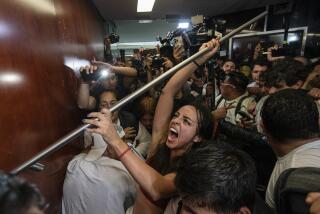Sandinistas Yield on Some Election Reforms; Opposition Wants More
- Share via
MANAGUA, Nicaragua — The government announced an election reform bill Friday that eliminates some of the ruling Sandinista Party’s advantages in the coming campaign but ignores the major demands of the opposition.
The bill, as submitted to Nicaragua’s National Assembly by President Daniel Ortega, would mandate equal broadcast time for advertising by each party registered in the Feb. 25 election and bar the Sandinistas from using government vehicles and other property in the campaign.
But it lacks several conditions for fairness outlined in a proposal this week by 15 opposition parties, including voting rights for exiles, denial of suffrage to members of the military and legalization of foreign contributions to political campaigns.
The Sandinista-controlled legislature is expected to debate the bill intensely and approve a modified package by April 25, the scheduled start of a 10-month electoral process.
Under a Feb. 14 peace accord among five Central American nations, Nicaragua was required to change its election law to give opposition parties “equitable participation” on the Supreme Electoral Council that will organize the voting. The election is to be held 10 months ahead of schedule, following four months of free political organization and a six-month campaign.
The debate over election reform is expected to have a bearing on efforts to settle the Nicaraguan war. The region’s presidents are to meet again next month, after the law is in force, and fulfill the other part of the peace pact by producing a plan to disarm the largely idled Contra army and close its military camps in Honduras.
Sandinista lawmakers said Friday that they recognize the need to satisfy some of the opposition’s demands to achieve the international credibility needed to advance the peace process.
The Sandinistas seized power in a 1979 guerrilla insurrection and held their only election at the height of the Contra war in 1984, retaining control of the government with two-thirds of the vote.
Anti-Sandinista forces are now divided between six parties that took part in that election and others that boycotted it, claiming the process to be stacked in the government’s favor. But opposition parties in the assembly agreed this week to press an agenda of reforms backed by those outside.
Among their demands is an allowance for voting by exiles in Nicaraguan embassies and consulates abroad. This is an important goal for the opposition because the estimated 300,000 Nicaraguans living in other Central American countries and the United States--about one-tenth of the population--are considered overwhelmingly critical of Sandinista rule.
TV Station Wanted
The 15 opposition parties are also seeking a general amnesty for anti-Sandinista prisoners, a suspension of military conscription during the campaign, abolition of a security law that gives the police broad arrest powers and permission for opposition groups to operate their own television station.
“Most important for us are the political conditions necessary for a fair election,” said Mauricio Diaz, an opposition lawmaker. “What the Sandinistas are offering are a maximum of legalities and a minimum of political conditions.”
The government proposal would allow opposition parties to name candidates for two of the five seats on the Superior Electoral Council, whose members are to be nominated by the president and chosen by the National Assembly. Opposition parties want four of the five seats.
The council would oversee all aspects of the election, including a voter registration period from Aug. 25 to Dec. 3. Eligible voters abroad would be allowed to register at Nicaraguan embassies or consulates outside the country but would have to return home to cast their ballots.
Any party would be barred from using state property in the campaign and government employees would be prohibited from campaigning during working hours--provisions that, if enforced, would go some way to neutralizing the Sandinistas’ huge advantage.
During the six-month campaign, opposition groups would be allowed to hold outdoor demonstrations without the police permission now required. Each party or coalition with candidates for national office would get 30 minutes of air time on the state-owned television network, 45 minutes on state-owned radio stations and 30 minutes on private radio stations each day.
This provision would modify the current electoral law that distributes air time according to the number of votes polled in the previous election. However, a similar formula for distributing government funds for the campaign would be changed only slightly by the government bill. It now says that 60% of the funds will be distributed equally and 40% of them according to votes each party polled in 1984.
Sandinista officials said Friday they might be willing to consider offsetting their party’s financial advantage by lifting a ban on foreign funding of the opposition campaign.
More to Read
Sign up for Essential California
The most important California stories and recommendations in your inbox every morning.
You may occasionally receive promotional content from the Los Angeles Times.













